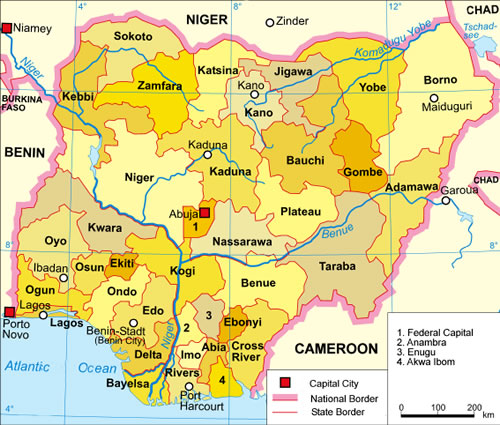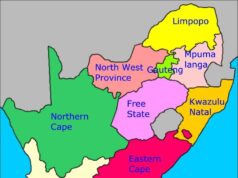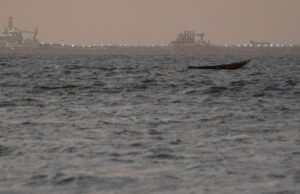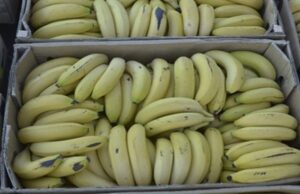
OVERVIEW
Nigeria is one of the most populous and economically significant nations in Africa. It is situated in West Africa in the Gulf of Guinea, with a total area of 923,770 km² (356,669 mi²) and a total coastline of 853 km (530.0 mi). Nigeria is thus one of the largest countries in Africa and the 32nd biggest in the world. More than half of all residents (54%) live within cities.
NIGERIA – KEY STATISTICS
| Real GDP growth rate | 3.1% |
| GDP, current prices (billions of U.S. dollars) | 394.94 |
| GDP per capita, current prices (U.S. dollars per capita) | 1.73 thousand |
| GDP, current prices (Purchasing power parity; billions of international dollars) | 1.44 thousand |
| Population | 227.71 million |
| Inflation rate | 23% |
| Unemployment rate | 5% |
| Country Group | Developing/Emerging:
Lower-middle income |
GDP, current prices (billions of U.S. dollars)
The GDP of Nigeria in the current prices is given as 394.94 and the GDP per capita, current prices (U.S. dollars per capita) is 1.73 thousand and the real GDP growth rate being 3.1%. The graph depicts a positive trend in GDP with a fair share of highs and lows over the years. In the current scenario there have been some fluctuations in the GDP due to economic and global scenario.

Fig: GDP, current prices (billions of U.S. dollars)

Fig: GDP per capita, current prices (U.S. dollars per capita)
Source: IMF
GDP, current prices (Purchasing power parity; billions of international dollars)
The GDP, current prices (Purchasing power parity; billions of international dollars) is 1.44 thousand. The PPP adjusts for the price level differences between the countries allowing for a more precise comparison. GDP calculated in this method caters to a higher amount than the nominal GDP for the developing countries since the prices are lower in such countries than the advanced economies.

Fig: GDP, current prices (Purchasing power parity; billions of international dollars)
Source: IMF
Inflation rate
The current inflation rate is 23%. The inflation rate in Nigeria have mostly been in double digits as can be seen in the chart depicted below. Moreover, such high inflation rates may hamper the purchasing power, consumer confidence and the long-term economic growth.

Fig: Inflation rate
Source: IMF
Unemployment rate
According to the reports of the National Bureau of Statistics, the unemployment rate in Nigeria for Q3 of 2023 is 5%. There has been a substantial decline in the unemployment rate as compared to the reports of 2018 (IMF) which stated the rate at 22.6%. Thus, there have been various initiatives as well as policy recommendations taken up by the government which facilitated in achieving the same.
TRADE
The domestic trade mainly comprises staple food, and the direction of trade moves between north to south, connecting various ecological regions. The products traded include cassava, yam, beans, onions, kola nuts, livestock, etc.
The Nigerian market is mainly involved in the exports of crude oil, cocoa beans, and rubber, majorly traded to European countries, India, and the United States. Imports consist of manufactured goods, machinery and transport equipment, chemicals, and food, which mainly come from China, the EU, and the United States.
According to the latest reports available from the National Bureau of Statistics, Nigeria, here the total trade in Q3 2023 stood at ₦18,804.29 billion (USD 12.601 billion) and the total exports and total imports were valued at ₦10,346.60 billion (USD 6.944 billion) and ₦8,457.68 billion ($5.673 billion) respectively. Reports suggest that the total exports as well as the imports have increased as compared to the previous quarter.
The graphs below show the top fifteen products that have been imported and exported, to and from Nigeria. It is seen that the most imported product in Q3 is motor spirit, Nigeria mostly depends on other countries for this resource due to its limited refining capacity, cost efficiency and other reasons that lead to increased imports. At the same time, the most exported products are petroleum oils and oils obtained from bituminous minerals, crude. Nigeria is a land abundant with crude oil as a natural resource and hence constitutes the major share of the exports.

Fig: Top Fifteen Import Traded Products Q3 2023 
Fig: Imports – by sector
 Fig: Top Fifteen Export Traded Products Q3 2023
Fig: Top Fifteen Export Traded Products Q3 2023 Fig: Exports – by sector
Fig: Exports – by sector
Concerning the trade partners, China constitutes the major import partner of Nigeria. China has become a significant ally for Nigeria in development, trade, and investment, serving as the country’s foremost collaborator and contractor in infrastructure ventures. The total worth of these projects exceeds $77 billion and spans various sectors such as road construction, railway development, power generation, and building construction.
 Fig: Top Ten Import Trading Partners Q2 2023
Fig: Top Ten Import Trading Partners Q2 2023  Fig: Top Ten Export Trading Partners Q3 2023
Fig: Top Ten Export Trading Partners Q3 2023
In 2018, Nigeria entered into a cooperative agreement under the Belt and Road initiative with China. Since then, through collaborative endeavours, Nigeria has emerged as the primary market for Chinese contractors, the second-largest trading partner, and a significant investment hub for China in Africa.
Concerning exports, Spain constitutes the major export share from Nigeria followed by India and the Netherlands, fuel being the major exported product.
The United States is also one of the major trade partners of Nigeria. Nigeria ranks 58th among the US trade partners. In 2022, trade between both countries was valued at $4.45 billion. They maintain a bilateral Trade and Investment Framework Agreement (TIFA), indicating a structured framework for facilitating trade and investment discussions between the two nations. Additionally, Nigeria qualifies for preferential trade benefits under the African Growth and Opportunity Act (AGOA), fostering enhanced trade relations and economic cooperation between Nigeria and the United States. Moreover, Nigeria benefits from development assistance provided by various agencies of the U.S. government, including the United States Agency for International Development (USAID).
Other than the inter-country trades, Nigeria is also involved in intra-country trades, Nigeria holds a significant leadership position within both West Africa and the broader African continent. The capital city of Abuja hosts the headquarters of the Economic Community of West African States (ECOWAS), where Nigeria’s influence is palpable. With approximately 70% of the total GDP and more than half of the population of the ECOWAS region, Nigeria’s stature within the organization is substantial. In 2019, Nigeria took a significant step by signing the African Continental Free Trade Agreement (AfCFTA), which aims to foster intra-African trade and establish a vast economic bloc worth USD 3.4 trillion across Sub-Saharan Africa.
Listed below are the few existing trade agreements and alliances entered into by Nigeria:
Existing trade agreements
- COMESSA – Community of Sahel-Saharan States
- ECOWAS – Economic Community of West African States
- OPEC – Organization of Petroleum Exporting Countries
- African Continental Free Trade Agreement
- Trade and Investment Framework Agreement
Alliances
- African Union
- Non-Aligned Movement
- Commonwealth of Nations
- G20 – Developing Nations
- G33 – Forum for developing countries
- OIC – Organization of Islamic Cooperation
- UN – United Nations
- UNESCO
- WTO – World Trade Organization
NATURAL RESOURCES
Nigeria is one of those African countries that is endowed with abundant natural resources, consisting of crude oil, mineral resources, precious metals, and other varieties of stones. The country has rich varieties of both renewable and non-renewable resources, most of them not discovered or optimally utilised to date. This provides a vast opportunity for domestic as well as foreign investors to explore this region offering varieties of mineral resources. Gold and gemstones are some resources which are recently booming across Nigeria, offering prospects for future investments.
Given below are available resources and their quantity across the region:
| Oil Reserves | 23 billion barrels |
| Gas Reserves | 160 trillion cubic meters |
| Talc | 40 million tonnes |
| Gypsum | 1 billion tonnes |
| Iron Ore | 3 billion metric tonnes |
| Lead/Zinc | 10 million tonnes of lead/zinc veins are spread over eight states of Nigeria |
| Bentonite and Baryte | Baryte – 7.5 million tonnes
Bentonite reserves – 700 million tonnes |
| Bitume | 42 billion tonnes |
| Coal | · Indicated reserves in 17 identified coal fields – 3 billion tonnes.
· Proven reserves – over 600 million tonnes. |
| Rock Salt | 1.5 million tonnes |
| Kaolin | 3 billion tonnes |
SECTORAL PROFILE
Agriculture
The agriculture sector mainly consists of four sub activities namely, crop production, livestock, fishing, and forestry. The agricultural land in Nigeria spans up to 70.8 million hectares, with major production being, maize, cassava, guinea corn, yam beans, millet and rice. Crop production is seen to be one of the top contributing activities to real GDP, contributing around 23.86% in the Q4 of 2023. Nigeria is one of the largest producers of cassava in the world, and with the new varieties being introduced, it is expected to grow further in the coming years.
Livestock production is one of the underexplored areas in Nigeria, where in most of the production takes place in the northern part of the country. Here, the demand outweighs the production and hence needs to be looked into for opening avenues for more production.
Concerning the fisheries, Nigeria is the largest fish consumer in Africa and one of the largest consumers in the world, reports suggest that around 3.2 million fish is consumed annually. With a shoreline spanning 853 km and inland water bodies covering over 14 million hectares, Nigeria’s annual fish production amounts to nearly 1 million metric tons, comprising 313,231 metric tons from aquaculture and 759,828 metric tons from fisheries. Here, fishing is one of the major sources of livelihood for the poor.
Manufacturing
The manufacturing sector in Nigeria comprises of thirteen activities, namely, Oil Refining; Cement; Food, Beverages and Tobacco; Textile, Apparel, and Footwear; Wood and Wood products; Pulp Paper and Paper products; Chemical and Pharmaceutical products; Non-metallic Products, Plastic and Rubber products; Electrical and Electronic; Basic Metal and Iron and Steel; Motor Vehicles and Assembly; and Other Manufacturing.
The sector grew by around 30.93% in 2023. The country has competent capital-intensive industries, such as steel mills, pulp and paper mills, petrochemical plants, and an aluminium smelter. This sector is heavily dependent on imports for raw materials, steps have been taken to reduce the import dependence and increase the domestic production but still there are considerable number who rely on imports for production.
According to the reports from Nigeria Investment Promotion Council (NIPC), 60% of the industrial base in set up in Lagos and the surrounding areas; and Kano, Aba, Ibadan and Kaduna form the key industrial areas in Nigeria.
Infrastructure
- Transport and Storage:
This includes Road Transport; Rail Transport and Pipelines; Water Transport; Air Transport; Transport Services; and Post and Courier Services. Roads constitute one of the major modes of transport in Nigeria, and most of the areas with high levels of economic activity face the issue of traffic such as Lagos.
The railroad system has two single-track trunk lines: the eastern line from Port Harcourt to Maiduguri and the western line from Lagos to Kano.
Concerning shipping, Delta Ports (in Warri), Calabar, and Port Harcourt, administered by the Nigerian Ports Authority, are the main international seaports and Bonny and Burutu form the major ports for shipment of petroleum.
Air transport serves nearly all state capitals, with Lagos, Kano, Abuja, and Port Harcourt managing the majority of international air traffic.
- Information and Communication sector:
The Information and Communication sector is composed of the four activities of
Telecommunications and Information Services; Publishing; Motion Picture, Sound Recording and Music Production; and Broadcasting. Nigeria is recognized as the largest ICT market in Africa, accounting for approximately 82% of the continent’s telecoms subscribers and 29% of internet usage. According to reports this sector contributed 12.52% to the total GDP in the fourth quarter of 2024.
- Construction:
This sector contributed 9% to GDP in the fourth quarter of 2023. The projects are undertaken by both the government and the private investors. The government mainly undertakes the construction of public infrastructure such as roads, railways, ports, etc. and the construction of commercial and residential buildings are mainly undertaken by the private investors. The government investments are mainly funded by the public-private partnerships (PPPs), multilateral development banks (MDBs), and bilateral creditors.
Finance and Insurance
This sector grew by 28.24% in the year 2023 with the contribution to GDP being 3.76% in Q4 of 2023. There are two segments included in the insurance, namely, life insurance and general insurance. Though the penetration of insurance is low in Nigeria, efforts are being made to widen the coverage in the coming years.
- Foreign Direct Investment
Nigeria is one of the upcoming economies in the world that attracts a major share of the Foreign Direct Investment from across the world. The major sectors in which investments are received are oil and gas, manufacturing, real estate, construction and agriculture. Nigeria aims attract inflows into the manufacturing sector, aiming to enhance its participation in global value chains and increase productivity. The consolidation of trade, industry, and investment within the Federal Ministry of Industry, Trade, and Investment reflects Nigeria’s commitment to effectively managing these critical areas to enhance its trade and investment environment. The country benefits from factors such as a partially privatized economy, favourable tax policies, abundant natural resources, and a relatively low labour cost. However, challenges including widespread corruption, political instability, lack of transparency, security concerns, import restrictions, and inadequate infrastructure quality hinder Nigeria’s potential for foreign direct investment (FDI).
According to the reports from the National Bureau of Statistics (Nigeria), the total capital importation in the Q4 of 2023 was recorded as US$1,088.48 million. With the other investment highest share of 54.64% (US$594.74 million) followed by Portfolio Investment with 28.46% (US$309.76 million) and Foreign Direct Investment
(FDI) with 16.90% (US$183.97 million).
The below graphs and pie chart shows the top investing countries in Nigeria, the destination of investment and the sectors that receive the investments.
 Fig: Capital Importation by Country Origin (US$ million)
Fig: Capital Importation by Country Origin (US$ million)  Fig: Capital Importation by Destination of Investment (US$ million)
Fig: Capital Importation by Destination of Investment (US$ million)
 Fig: Capital Importation by Selected Sector (US$ million)
Fig: Capital Importation by Selected Sector (US$ million)
- Fintech:
With the increase in the internet penetration and digitalisation, there have been an increase in the number of Fintech’s in Nigeria. More and more investors are investing in the Fintech sector, with the investments being more than $200 million USD. The government aims to increase the financial literacy in the economy through the introduction of Fintech and provide an easier access to capital and to drive a cashless economy. However, there are various challenges that must be surpassed to build a sustainable Fintech ecosystem, challenges such as improper infrastructure, lack of regulatory systems, etc., pose a problem.
References
https://www.nigerianstat.gov.ng/
https://www.imf.org/external/datamapper/profile/NGA
https://www.lloydsbanktrade.com/en/market-potential/nigeria/investment
https://nigeria.gov.ng/about-nigeria/nigeria-natural-resources/
https://www.worlddata.info/africa/nigeria/index.php
https://www.fao.org/nigeria/fao-in-nigeria/nigeria-at-a-glance/en/
https://www.britannica.com/place/Nigeria/Resources-and-power
https://www.trade.gov/country-commercial-guides/nigeria-information-and-communications-technology





